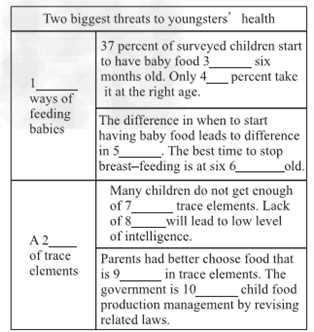|
Chinese parents are being urged to pay more attention to their children's nutrition, after a study
revealed that unscientific ways of feeding babies and a lack of trace elements are the two biggest threats
to youngsters'health. Experts drew these conclusions from a two year study into the nutrition and health
situation of children under six in ten cities including Beijing, Shanghai and Guangzhou.
Started in 2003 by the China National Children's Center, the survey includes 8043 children, equally
divided between the sexes. It shows 37 percent of surveyed children have baby food earlier than the
recommended age of four to six months old, with another 35percent taking it later, which in return brings
about a nutrition difference as these children grow up. "Our children above four to six months old fall
behind foreign children in terms of their physical well?being," said Zhao Shunyi, head of the center. She
called on Chinese parents to pay more attention to their children's nutrition after they stop breast feeding
at six months old.
Trace elements
The survey also shows more than half of the children above six months old are deficient in five trace
elements which are crucial to their physical development-magnesium, copper, calcium, iron and zinc.
"Lack of zinc will lead to low level of intelligence," said Dou Xiaowei, vice director of the National Center
for Child Nutrition Quality Supervision and Testing. "Parents had better choose baby food with plentiful
trace elements, especially calcium, iron and zinc."
Zhao said, "The center is urging the government to strengthen child food production management by
revising related laws. Child food producers should be advised to market products with rich trace
elements."

|
